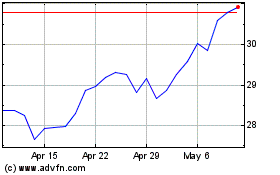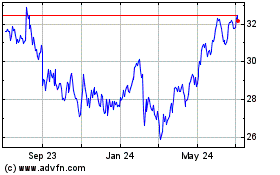By Keach Hagey
Jeff Bewkes, the chief executive of Time Warner Inc., built his
reputation on shrinking the media conglomerate down to focus on TV
and film content by unraveling the failed marriage with AOL and
breaking free from the Time Warner Cable distribution business.
Now, before exiting stage left, he is writing his own legacy
with the $85 billion sale to AT&T Inc. that will reunite Time
Warner's coveted content with a vast distribution network that
spans satellite TV and mobile phones.
The price -- $107.50 a share, a 36% premium over where Time
Warner's stock had been trading in the middle of last week --
represents a triumph for Mr. Bewkes, two years after he walked away
from an $85-a-share offer from 21st Century Fox Inc.
But the sale to AT&T also represents a strategic departure
for Mr. Bewkes, who spent his nearly nine years as CEO slimming
down the onetime media behemoth, unwinding the AOL merger and
spinning out Time Warner Cable and Time Inc. The three businesses
that remained -- HBO, Turner Broadcasting and Warner Bros. -- are
focused solely on video content. In lieu of acquisitions, Mr.
Bewkes focused on containing costs and buying back stock.
A cerebral Stanford M.B.A. known for his financial acumen, Mr.
Bewkes implemented a strategy shaped in part by scars from the
disastrous AOL-Time Warner merger that closed in 2001.
While the ill-fated deal carried lofty promises of new online
distribution methods for Time Warner's sprawling cache of content,
it ultimately left shareholders in the combined company --
including employees such as Mr. Bewkes -- in a lurch after AOL's
business collapsed.
Mr. Bewkes said a big difference from the AOL days is that
distribution has become even more central to giving consumers what
they demand from media. They want more flexibility in the packages
they can buy and the platforms they can accesses content from.
Much has changed in the media landscape in recent years.
The rise of Netflix Inc. and YouTube and growth of so-called
"skinny bundles" -- smaller, cheaper packages of channels -- has
chipped away at the longtime engine of media companies'
profitability: the ever-rising fees they could once depend upon
from pay-TV distributors.
Time Warner first attempted to meet the challenge from more
nimble streaming competitors by pioneering so-called "TV
Everywhere," which allowed viewers to watch its content on
desktops, mobile devices and streaming video players -- but only if
they proved they were pay-TV subscribers. The model's rollout
across the industry was frustratingly slow, Mr. Bewkes often noted.
Meanwhile, Netflix, Amazon Prime Instant Video and Hulu's market
share exploded.
More recently, Time Warner has tried to meet the challenge by
launching its own direct-to-consumer products, such as the
broadband-delivered HBO Now.
In a conference call Saturday night, Mr. Bewkes cast Time
Warner's tie-up with AT&T as a continuation of his quest to
give consumers more of the shows they want, when and where they
want them.
In an industry whose leaders are often described as "moguls,"
Mr. Bewkes cut a different figure. He grew up in Darien, Conn., the
son of a businessman, and spent his days at Yale University
studying philosophy and hanging out with the artistic crowd. His
first media job was making documentaries for NBC News. But after
getting his M.B.A., he went into the business side, joining a
fledgling HBO in 1979 following a stint at Citibank. He never left,
steadily rising through the ranks at HBO to CEO, and then to CEO of
its parent company in 2008.
After the deal closes, Mr. Bewkes, 64, said he would stay on for
an interim period to help with the transition.
If he exits as part of the change in control, he could stand to
walk with what today would be worth almost $95 million, including
the value of his stock, according to regulatory filings. However,
he has said he plans to stay on at least until the deal closes,
expected at the end of 2017, and perhaps beyond.
Unlike many companies, Time Warner doesn't have so-called golden
parachute payments for executives if they are dismissed as part of
an acquisition. Instead, Mr. Bewkes would get almost $24 million in
options and other benefits like the maintenance of his
life-insurance plan. Plus, he owns about 658,000 shares of Time
Warner, which are valued by AT&T's cash-and-stock offer at
about $71 million.
Not an ego-driven builder, Mr. Bewkes turned Time Warner into a
takeover target by spinning and slimming the once far-flung
conglomerate.
When 21st Century Fox came calling in 2014, attracted by the HBO
crown jewel and synergies between the similar companies, Mr. Bewkes
and his team were unimpressed by both the form and the content of
the offer -- presented at a lunch with Fox's then-Chief Operating
Officer Chase Carey.
Time Warner rejected the approach. At the same time, they made
clear that should another suitor come along from the tech or
telecom worlds with a better price and more cash, it might be
entertained.
Time Warner then made a bold pitch to investors that it could
top Fox's $85-a-share price on its own. It surprised the media
world by announcing the direct-to-consumer HBO Now. While the stock
did push past that level for a time, it spent much of the past year
well below that, dragged down by sector-wide concerns about
cord-cutting.
Mr. Bewkes faced pressure from some investors to consider
breaking up the company and potentially spinning off HBO, but he
and the Time Warner board steadfastly refused. If a buyer wanted
Time Warner, they were going to have to take the whole thing.
Write to Keach Hagey at keach.hagey@wsj.com
(END) Dow Jones Newswires
October 23, 2016 15:42 ET (19:42 GMT)
Copyright (c) 2016 Dow Jones & Company, Inc.
Fox (NASDAQ:FOX)
Historical Stock Chart
From Mar 2024 to Apr 2024

Fox (NASDAQ:FOX)
Historical Stock Chart
From Apr 2023 to Apr 2024
